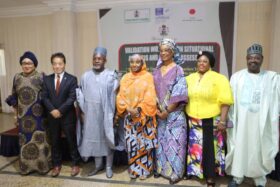The Federal Government has reiterated its firm commitment to empowering the Nigerian girl-child through inclusive, safe, and quality education.
Minister of State for Education, Prof Suwaiba Ahmad, made this known at a validation workshop on the situational analysis and baseline assessment of the Japan-funded UNESCO-IICBA project titled Capacity Building of Teachers to Promote Continuous and Inclusive Access to Safe and Quality Education for Girls in West Africa.
According to Ahmad, strengthening teachers’ capacity is key to creating a sustainable and inclusive learning environment for girls.
“We must continue to engage with local communities and educators to ensure sustainable progress,” she said.
She emphasised that girls’ education remains central to the government’s renewed initiatives, describing it as a catalyst for social transformation and national development.
“The empowerment of girls through education is not only a matter of equity but a prerequisite for national development. We have prioritised girl-child education as a holistic approach towards transformation,” she added.
Ahmad also stated that the project aligns with Nigeria’s Education Sector Renewal Initiative, underlining the importance of assessing its outcomes for future improvements.
Minister of State for Humanitarian Affairs and Poverty Reduction, Dr Tanko Sununu, stressed the project’s importance in addressing gender disparities in education.
He highlighted the significance of collaboration among governments, educators, and international organisations to achieve meaningful outcomes.
“We are fully committed to providing the necessary resources to make this project successful. This project is a critical step towards ensuring equal educational opportunities for girls across the region. Educating girls is one of the most powerful ways to drive social transformation and economic growth,” he said.
Chairperson of the Project Technical Team (PTT), Dr Uchenna Uba, affirmed the initiative’s relevance in tackling educational challenges facing girls in Nigeria. She described education as a powerful driver of social and economic change.
UNESCO-IICBA Director, Dr Quentin Wodon, highlighted the importance of using the project’s lessons to improve pre-service education for girls and expressed optimism about its long-term impact.
Deputy Head of Mission at the Japanese Embassy, Kozaki Hitoshi, reiterated Japan’s dedication to supporting education in Africa.
“The initiative we are validating today is important because it focuses not only on increasing access to primary and secondary education, but on strengthening the very people who are the backbone of the system—the teachers,” he said.
He confirmed Japan’s financial backing for regional educational initiatives, adding that the country is committed to expanding access to education for four million girls across Africa.
(NAN)


